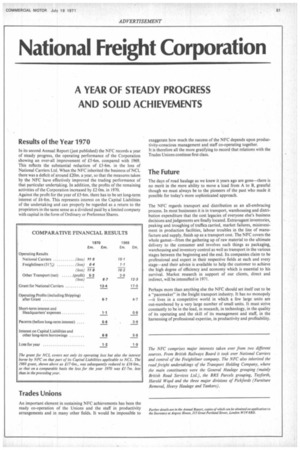A YEAR OF STEADY PROGRESS AND SOLID ACHIEVEMENTS
Page 53

If you've noticed an error in this article please click here to report it so we can fix it.
Results of the Year 1970
In its second Annual Report (just published) the NFC records a year of steady progress, the operating performance of the Corporation showing an over-all improvement of £5-6m. compared with 1969. This reflects the substantial reduction of £3-6m. in the loss of National Carriers Ltd. When the NFC inherited the business of NCL there was a deficit of around £20m. a year, so that the measures taken by the NFC have effectively improved the trading performance of that particular undertaking. In addition, the profits of the remaining activities of the Corporation increased by £20m. in 1970.
Against the profit for the year of f5-6m. there has to be set long-term interest of £68m. This represents interest on the Capital Liabilities of the undertaking and can properly be regarded as a return to the proprietors in the same sense as a dividend paid by a limited company with capital in the form of Ordinary or Preference Shares.
Trades Unions
An important element in sustaining NFC achievements has been the ready co-operation of the Unions and the staff in productivity arrangements and in many other fields. It would be impossible to
exaggerate how much the success of the NFC depends upon productivity-conscious management and staff co-operating together. It is therefore all the more gratifying to record that relations with the Trades Unions continue first class.
The Future
The days of road haulage as we knew it years ago are gone—there is no merit in the mere ability to move a load from A to B, grateful though we must always be to the pioneers of the past who made it possible for today's more sophisticated approach.
The NFC regards transport and distribution as an all-embracing process. In most businesses it is in transport, warehousing and distribution expenditure that the cost legacies of everyone else's business decisions and judgements are finally located. Extravagant inventories, peaking and troughing of traffics carried, market failures, misinvestmerit in production facilities, labour troubles in the line of manufacture and supply, finish up as a transport cost. The NFC covers the whole gamut—frbm the gathering up of raw material to the ultimate delivery to the consumer and involves such things as packaging, warehousing and inventory control as well as transport in the various stages between the beginning and the end. Its companies claim to be professional and expert in their respective fields at each and every stage—and their advice is available to help the customer to achieve the high degree of efficiency and economy which is essential to his survival. Market research in support of our clients, direct and indirect, will be intensified in 1971.
Perhaps more than anything else the NFC should set itself out to be a "pacemaker" in the freight transport industry. It has no monopoly —it lives in a competitive world in which a few large units are out-numbered by a very large number of small units. It must strive constantly to be in the lead, in research, in technology, in the quality of its operating and the skill of its management and staff, in the harnessing of professional expertise, in productivity and profitability,




























































































